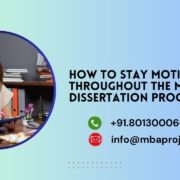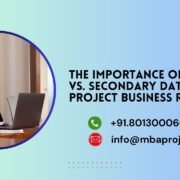Why Sustainability and Green Business Are Hot Topics for MBA Dissertations
Why Sustainability and Green Business Are Hot Topics for MBA Dissertations
Introduction
Why Sustainability and Green Business Are Hot Topics for MBA Dissertations. In recent years, sustainability and green business have emerged as critical focal points for MBA students seeking dissertation topics. As businesses increasingly prioritize environmental, social, and governance (ESG) factors, the demand for sustainable business strategies continues to grow. This shift is driven by climate change concerns, regulatory pressures, and consumer demand for eco-friendly products. Consequently, MBA students find sustainability an excellent research area that is not only academically relevant but also highly practical for real-world business applications.
The Rising Importance of Sustainability in Business
1. Corporate Social Responsibility (CSR) and Sustainable Business Models
Corporate Social Responsibility (CSR) has evolved from a voluntary initiative to a business necessity. Companies incorporating CSR into their operations benefit from enhanced brand reputation, customer loyalty, and competitive advantage. MBA dissertations can explore various aspects of CSR, such as:
- The impact of CSR on financial performance
- How multinational corporations implement sustainable business practices
- CSR initiatives and their effect on consumer purchasing behavior
2. Green Supply Chain Management
Sustainability is a key concern in global supply chain management. Many organizations are now adopting green supply chain strategies to reduce waste, lower carbon footprints, and enhance efficiency. MBA students may consider researching:
- The challenges and benefits of green logistics
- How blockchain technology can enhance transparency in sustainable supply chains
- Case studies of companies successfully implementing eco-friendly supply chains
3. Renewable Energy and Sustainable Business Strategies
Businesses are increasingly investing in renewable energy sources such as solar, wind, and hydroelectric power to reduce dependency on fossil fuels. Dissertation topics in this field could include:
- The economic feasibility of renewable energy adoption in corporations
- Government incentives and their role in promoting sustainable energy investments
- The role of carbon credits in business sustainability strategies
Sustainability and Green Business in Financial Decision-Making
4. Green Finance and Investment Trends
Sustainable investing, or Environmental, Social, and Governance (ESG) investing, has gained significant traction. Investors now consider non-financial factors when making investment decisions. Potential research areas include:
- The impact of ESG criteria on investment portfolios
- How green bonds contribute to corporate sustainability
- The relationship between sustainability ratings and company stock performance
5. Circular Economy and Sustainable Business Models
A circular economy focuses on minimizing waste through recycling, reuse, and resource efficiency. Businesses embracing circular economy principles improve profitability while reducing environmental impact. Dissertation topics could explore:
- The role of circular economy strategies in reducing operational costs
- How businesses can transition from linear to circular economic models
- Consumer perception of circular economy-based products
Regulatory and Policy Impacts on Sustainable Business
6. Government Policies and Sustainability Regulations
Governments worldwide are implementing stricter environmental policies to combat climate change. Companies must navigate regulatory challenges while maintaining profitability. Research areas in this category include:
- The effectiveness of carbon taxation in promoting sustainability
- How businesses adapt to evolving environmental regulations
- The role of public-private partnerships in achieving sustainability goals
7. The Role of International Organizations in Green Business
Global organizations, such as the United Nations (UN) and the World Economic Forum (WEF), play a crucial role in setting sustainability standards and influencing business practices. MBA students could analyze:
- How international agreements impact corporate sustainability strategies
- The influence of the UN Sustainable Development Goals (SDGs) on business operations
- Cross-border collaborations for promoting sustainable business initiatives
Consumer Behavior and Market Trends in Sustainable Business
8. Consumer Demand for Eco-Friendly Products
Consumer preferences are shifting toward sustainable, ethically sourced, and environmentally friendly products. Businesses that respond effectively to these changes gain a competitive edge. Potential dissertation topics include:
- The impact of sustainability certifications (e.g., Fair Trade, LEED) on consumer trust
- How digital marketing influences green consumer behavior
- The rise of sustainable fashion and its impact on the apparel industry
9. The Role of Technology in Sustainability
Technology is a key enabler of sustainable business practices. Companies leverage Artificial Intelligence (AI), Big Data, and the Internet of Things (IoT) to enhance efficiency and reduce environmental impact. Research topics could include:
- The role of AI in optimizing energy consumption in businesses
- How IoT helps companies track and reduce carbon emissions
- The potential of blockchain technology in ensuring sustainable business practices
Conclusion
Sustainability and green business have become pivotal in modern corporate strategy, making them highly relevant topics for MBA dissertations. By exploring areas such as CSR, green finance, renewable energy, government regulations, and consumer behavior, MBA students can contribute valuable insights into the future of sustainable business practices.
Thank you for reading our Blog “Why Sustainability and Green Business Are Hot Topics for MBA Dissertations”.
Also, read our more BLOG here.
For Order “MBA Projects” feel free to contact us at Mob: Call / WhatsApp: +91.8013000664 || Email: info@mbaprojects.net.in














